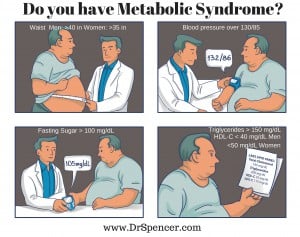Exercise, a Powerful Medicine: An Interview with Dr. Spencer Nadolsky

The following is an interview with Dr. Spencer Nadolsky, medical editor of Examine.com and a licensed practicing board certified family and bariatric (weight loss) medicine physician. What I really like about him is that he pushes lifestyle, whenever possible, to prevent and treat disease.
In this interview we discuss whether or not red meat causes cancer, what metabolic syndrome is (and when to know if you need to be screened for it), how "medicine-y" exercise is. Enjoy and learn!
Tim Arndt: Hello Dr. Spencer Nadolsky. First off, thanks for allowing me to interview you and pick your brain a bit. Let's get right down to biz…
Recently there has been some clamoring about the study that just came out saying red meat is going to give you cancer. Would you mind clarifying this for us? Is it something we need to take seriously or can I continue eating delicious steak for the rest of my life?

Dr. Spencer Nadolsky: There is definitely an effect going on with processed meats (sausage, bacon, deli meats, etc.) when looking at the data in relation to colorectal cancer and there is biological plausibility, but the absolute risk increase is small.
It isn't comparable to smoking cigarettes and the risk of lung cancer. The evidence isn't nearly as strong for unprocessed red meat like steak. Another thing to note is that fruits and vegetables decrease this effect. Eat mostly plants while enjoying your moderate intake of meat and once in a while processed meat.
For the record, I still have my ham and turkey sandwich for lunch a few times per week. I am not worried.
So the bigger deal is processed meats? Not necessarily red meats?
Yep. And it has always been this way. This isn't news.
Let me see if I have this right by giving you a completely fabricated example. Let's say a study came out that found that eating ice cubes increases your chance of having a heart attack by 75%! Wow, that's quite significant right? But let's also say your chances of having a heart attack are only 1%. Well, your chances are still really low and not much to worry about. Again, totally made up example, but does that about sum it up?
Yes. It is important to understand the difference between relative risk and absolute risk. It doesn't mean there is no increased risk though. Just something we should all understand if we are trying to eat as healthfully as possible without being miserable doing so.
I've heard you talk about how exercise is medicine. Just how medicine-y is it? How do you use it in your own practice?
Exercise might be one of the most powerful medicines out there to prevent and treat most chronic diseases, e.g. diabetes, hypertension, heart disease, etc. I ask every patient if they are exercising and if they are not, I ask them if they are interested in learning more about how to do it to treat/prevent disease along with, of course, looking and feeling better.
How have you seen exercise benefit your patients? Can you provide us an example?
In many of my patients, I prescribe either 30-60 minutes of walking per day or maybe 10,000 steps. Not only is there some weight loss (maybe 5 pounds or so), but their blood sugars go from a pre-diabetic range down to the normal range. It's quite common.
That's pretty impressive considering those lifestyle changes are fairly simple to do for most people.
I see so many people turn to cardio for fat loss and health benefits and barely, if ever, lift any weights. Are they missing out?
Yes, although not every patient likes to lift weights. They may have not had a good experience or felt the benefits. I recommend a combination of aerobic and resistance training to all patients.
Can you briefly explain what metabolic syndrome is and how it is relevant to belly fat?
Metabolic syndrome is a cluster of findings that all relate to the underlying issue of visceral fat and insulin resistance. Visceral fat is the fat that surrounds your organs, as opposed to subcutaneous fat which is the stuff you can pinch.
Essentially, it is a group of related factors/signs/symptoms that increase our risk of heart disease, type-2 diabetes and death. Here are the criteria (you need 3 of the following):
- Increased Waist Circumference: Men with waists greater than, or equal to, 40 inches (102 cm) and women 35 inches (88 cm). In places other than the USA, the cutoffs may be much lower (e.g. South Asia is 90 cm for men and 80 cm for women).
Remember to measure your waist circumference correctly. It is not your pants waist size. Measure parallel to ground and just above your hip bones. Also remember that this is likely the cause of the rest. - Elevated Blood Pressure: A blood pressure over 130/85 mm Hg.
- Elevated triglycerides and/or Low HDL: Triglycerides over 150 mg/dL is one component. Having low HDL-C is another. For guys, under 40 mg/dL and women under 50 mg/dL HDL-C is criteria. Each of these components can count towards the criteria (high triglycerides as one and low HDL-c as another). Many have both though.
- Elevated fasting sugars: A fasting blood sugar of 100 mg/dL and above. Could also be what is called "impaired glucose tolerance" if you do a glucose tolerance test. This is where you drink a beverage with 75 grams of glucose in it and then test your blood sugar after 2 hours. If it is above 140 mg/dL, then you have "impaired glucose tolerance".

To follow that up, why, for males, is the 40" abdomen circumference mark so significant?
This is where researchers have found as a good cut off when looking for this syndrome when relating to the risks etc.
So a large majority of males who have metabolic syndrome are over 40 inches?
If you are a male with a waist circumference over 40 inches, I would get screened for pre-diabetes for sure.
What if it was 39 ¾ inches?
Right, so you could have visceral fat and metabolic syndrome without the 40 inches, but this was felt to be a good cutoff looking at statistics in the USA. As mentioned, other ethnicities, specifically south Asians, have cutoffs much lower.
That's interesting. Why do you think that is?
Genetics, epigenetics and evolution. I have heard a few researchers hypothesize about why.
What about for women? Is it as big of a deal? What's the circumference they should be looking out for?
Yes, absolutely. In the US, the cutoff is 35 inches.
Is metabolic syndrome more prevalent in men?
The percentages are very similar.
Very interesting! I would have thought it was way more prevalent in men.
I know you worked on a book about which medicines cause weight gain. Can you tell us a little about that and why you decided to write it?
I wanted a go-to resource for my patients to have reliable information about weight loss, so I decided to sit down and finally make one. I also have followers on the internet looking for a go-to source on weight loss and medical weight loss and I got tired of answering the same questions over and over again. Now I can refer to the book.
The book is called, "The Fat Loss Prescription." It has all of the information that I go through for a patient to help them lose weight. It is written for the patient though and not necessarily for another physician, although they would find it useful too.
If there are other alternatives for medicines that work and don't cause weight gain, why isn't everybody taking these?
It can be complicated due to insurances/wealth of the patient, or potentially the alternatives wouldn't work in those situations. Sometimes it is just good to know that there is a barrier and to be aware of it.

OK, it's time to get personal. Obviously you've won the genetic lottery with your physique. I hope you've told your parents, "thank you," like a good boy! But I know you've also worked hard on capitalizing on what your parents gave you. What's your exercise routine look like these days?
I actually do a plan that is in my book. Four days of lifting (split upper and lower) along with 3-4 days of aerobic training (each is either 3 mile run, 10-15 mile bike ride, or HIIT on an Airdyne Bike).
Alright, now for the most important question: How much do you bench, squat and deadlift? I bet my grandma lifts as much as you.
My bench right now is around 405 lbs. I have had some aches and pains to where I can barely squat so I have no idea. Deadlift causes pain too, but it is over 500.
See, I was right!
Alas, I have to wrap this interview up. However, I'm sure some of our readers would like to follow you and watch your videos of you lifting in your speedo's, where would they go to do this?
I would probably just direct them to www.DrSpencer.com which has everything there. :-)
Thanks for your time Dr. Nadolsky. Hope we can do it again in the future. I look forward to reading your book.

